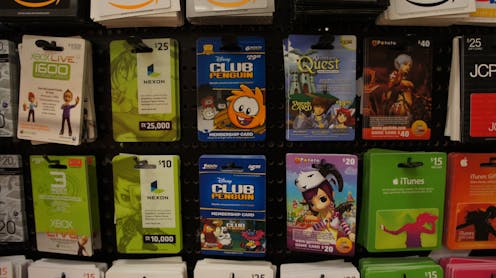What happens when companies remove expiry dates on gift cards?
- Written by Saurav Dutta, Head of School at the School of Accounting, Curtin University

From April 1 onwards, new Woolworths gift cards will no longer have an expiry date[1], and all gift cards sold in New South Wales will have a three-year minimum expiry date[2]. But these policies aren’t a clear win for either consumers or retailers.
Consumers will get more flexibility from the elimination of expiry dates, but the lack of urgency to use their gift cards makes it more likely that the cards will be lost or forgotten. When a retailer goes bust[3], the outstanding gift cards may not be honoured. Additionally, due to inflation, the purchasing power of gift cards will drop over time.
For retailers, the removal of gift card expiry dates should result in increased sales, a larger customer base, and better cash flows. However, they will also see an increase in liabilities on their balance sheets[4]. Higher liabilities on balance sheet generally increases the cost of capital for the company.
Read more: Gift cards often end up in the bin, but extending their life might not help[5]
Australians leave around A$70 million[6] unused on gift cards each year.
A survey last year[7] found that men were more careless with gift cards, leaving an average of A$69 on expired gift cards, compared to A$45 for women.
Younger Australians[8] leave less money on gift cards than older generations, with baby boomers letting an average of A$65 expire compared to A$44 left unspent by Gen Y.
When the United States banned expiry dates on gift cards in 2009 the unused amount on gift cards dropped[9], from US$7 per US$100 in 2008 to less than US$0.75 per US$100 in 2015.
For retailers the obvious benefit of gift cards is that they receive the money up front - this is tantamount to an interest-free loan from the consumer to the business.
Although a retailer collects the cash for a gift card immediately upon sale, it does not actually recognise the revenue on its financial statements until the gift card is redeemed or expired. This means that for retailers, a gift card is a liability.
Removing expiry dates means that these liabilities will remain on the balance sheet for much longer than they currently do. This increases both the administration costs and the cost of capital for retailers.
When gift cards are only partially used or forfeited entirely (because they are lost or forgotten) it is called “breakage[10]”, allowing the retailer to remove the liability from their accounts and recognise the unredeemed money as revenue.
As such, retailers are always eager to sell gift cards, as a certain percentage of them will go unredeemed or partially redeemed. This is essentially free money. Home Depot, in just one quarter in 2005, recognised US$43 million[11] in gift card breakage.
Read more: Xenophon is right to call for law reform on gift cards[12]
In 2015[13], A$2.5 billion of gift cards were sold in Australia alone, and nearly 90% of Australians have either received or given one as a present.
Studies show that gift cards affect how people perceive a gift, how much they spend, and what they spend it on.
Gift card recipients use the cards differently[14] than they would have used a similar amount of cash. For instance, they are more likely to spend the money on luxuries than “normal” goods.
Gift card recipients are also likely to spend money beyond the value of the gift card when making purchases. In some academic experiments[15] gift card recipients spent almost double the amount than if they had an equivalent amount of cash.
In Australia, unclaimed money generally has to be turned over to the government[16], but this doesn’t apply to gift cards because they do not meet[17] the definition of “money” as defined in various legislation.
As such, gift cards have been a good source of revenue for Australian companies[18] as they have been allowed to keep unredeemed money.
We can only hope that with the extended expiry dates on gift cards, the consumers will fully redeem their gift cards and not leave money on the table, or on cards!
References
- ^ no longer have an expiry date (www.woolworthsgroup.com.au)
- ^ a three-year minimum expiry date (www.fairtrading.nsw.gov.au)
- ^ When a retailer goes bust (theconversation.com)
- ^ increase in liabilities on their balance sheets (www.woolworthsgroup.com.au)
- ^ Gift cards often end up in the bin, but extending their life might not help (theconversation.com)
- ^ around A$70 million (www.finder.com.au)
- ^ survey last year (www.finder.com.au)
- ^ Younger Australians (www.finder.com.au)
- ^ dropped (www.cebglobal.com)
- ^ breakage (www.investopedia.com)
- ^ recognised US$43 million (search.proquest.com)
- ^ Xenophon is right to call for law reform on gift cards (theconversation.com)
- ^ In 2015 (indue.com.au)
- ^ use the cards differently (www.acrwebsite.org)
- ^ In some academic experiments (www.acrwebsite.org)
- ^ generally has to be turned over to the government (www8.austlii.edu.au)
- ^ do not meet (treasury.gov.au)
- ^ good source of revenue for Australian companies (www.woolworthsgroup.com.au)
Authors: Saurav Dutta, Head of School at the School of Accounting, Curtin University
Read more http://theconversation.com/what-happens-when-companies-remove-expiry-dates-on-gift-cards-93369







